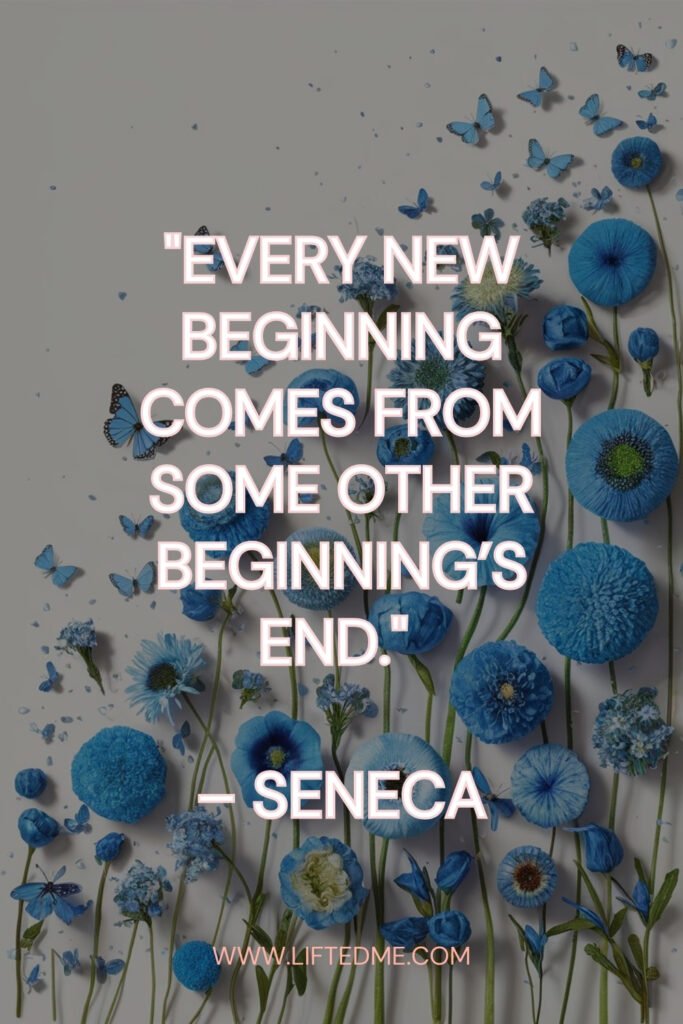How To Approach The New Year With A Positive Mindset
This post contains paid and/or affiliate links. I make a small commission at no extra cost to you. Please see our Privacy Policy.
The New Year is a fresh start, a blank canvas waiting for your artistic touch. It’s the perfect time to reflect on the past year and set your intentions for what’s to come. Approaching the New Year with a positive mindset can help you navigate challenges and embrace opportunities. Here are some steps to help you cultivate that positive outlook as the calendar turns.
Reflect on the Past Year
Before diving into the New Year, take a moment to reflect on the previous year. Ask yourself:
- I am proud of my many accomplishments.
- What challenges did I overcome?
- What lessons did I learn from this?
Recognizing your successes, no matter how small, can boost your confidence. Acknowledge the hurdles you faced and appreciate your resilience. This reflection sets a positive tone as you move forward.
Set Realistic Goals
A common practice at the start of the New Year is goal-setting. Instead of overwhelming yourself with a long list of resolutions, choose a few realistic and achievable goals. Consider the SMART criteria: Specific, Measurable, Achievable, Relevant, and Time-bound.
- Specific: Clearly define what you want to achieve.
- Measurable: Determine how you will track your progress.
- Achievable: Ensure your goal is attainable.
- Relevant: Align your goals with your values and interests.
- Time-bound: Set a deadline for achieving your goals.
By setting realistic goals, you pave a clear path for yourself and foster a sense of accomplishment with each milestone reached.

Embrace a Growth Mindset
Adopting a growth mindset can significantly impact how you approach the New Year. Instead of seeing challenges as obstacles, view them as opportunities for growth. When you encounter setbacks, ask yourself what you can learn from the experience. This mindset shift helps you stay positive and focused.
Practice Gratitude
Gratitude is a powerful tool in shaping a positive mindset. Take time each day to recognize the things you’re grateful for. Consider keeping a gratitude journal where you jot down at least three things each day that bring you joy or peace. This simple practice can shift your focus from what you lack to what you have, promoting a positive perspective.
Surround Yourself with Positivity
Your environment plays a big role in your mindset. Surround yourself with positive influences, whether they are friends, family, or inspirational books and podcasts. Engage in activities that uplift you and foster a supportive community. This positive environment can encourage you to remain optimistic and motivated throughout the year.
Take Care of Yourself
Your mental and physical well-being can greatly affect your outlook on life. Prioritize self-care by engaging in activities that rejuvenate you. This can include:
- Exercising regularly to boost endorphins.
- Eating a balanced diet to fuel your body.
- Practicing mindfulness or meditation to reduce stress.
- Getting enough sleep to recharge.
When you feel good physically, you’ll find it easier to maintain a positive mindset.
Celebrate Small Wins
As you progress through the New Year, celebrate your achievements, no matter how minor. Acknowledging these wins builds confidence and reinforces a positive mindset. Whether it’s completing a project at work or simply getting out of bed on a difficult day, recognize and celebrate each success.
Stay Open to Change
Embrace the uncertainty of the New Year. Change can be intimidating, but it often brings growth. Stay open to new experiences and challenges that come your way. You’ll be surprised by the opportunities that can emerge when you maintain a flexible and positive outlook.
As the New Year approaches, remember that a positive mindset is a powerful ally. With reflection, realistic goals, a growth mindset, gratitude, supportive environments, self-care, celebration of wins, and openness to change, you can start the year with optimism and enthusiasm. Embrace the journey ahead and make the most of every moment.

Setting Realistic and Achievable Goals for the Year Ahead
As the new year comes, many are excited for what it brings. Setting goals can turn that excitement into real achievements. But, it’s key to make sure these goals are doable. This way, you’ll stay motivated and reach your goals.
Start with the SMART criteria for your goals. They should be Specific, Measurable, Achievable, Relevant, and Time-bound. This framework helps you create a clear path to success.
Your Goals Should Be Specific
Vague goals can feel overwhelming because they’re unclear. Instead of saying “I want to exercise more,” be specific. For example, “I want to go for a 30-minute jog three times a week.” This makes it easier to track your progress.
Make Your Goals Measurable
Understanding your progress is key. If you want to read more, say how many books you aim to read. For example, “I want to read 12 books by the end of the year.” This lets you celebrate small wins and stay motivated.
Ensure Achievability
While aiming high is good, setting goals that are too high can be discouraging. Assess what you can realistically do. For instance, “I want to learn to play the guitar” is achievable if you plan for lessons and practice. But, “I want to perform at a concert within a month” might be too ambitious for a beginner.
Make Your Goals Relevant
Relevance means your goals should align with your life’s bigger picture. Ask yourself why a goal matters. Aligning your goals with your values gives you purpose and drive. For example, aiming for a promotion at work should fit into your career goals.
Set Time-Bound Goals
Time is important in goal-setting. Deadlines create urgency and prevent procrastination. Instead of saying, “I want to save money,” say, “I want to save $1,000 by June.” This timeline helps you stay focused and track your progress.
With these tips, you can improve your goal-setting. Here are a few more:
- Break It Down: Big goals can feel overwhelming. Break them into smaller tasks. For example, if you want to lose 20 pounds, plan healthy eating and exercise for each week.
- Stay Flexible: Life is unpredictable, and plans might change. Be open to adjusting your goals without feeling like you’ve failed.
- Accountability: Share your goals with friends or family. Having someone check in can keep you motivated.
Reflect Regularly
Regularly reflect on your goals. Ask yourself if you’re on track or if you need to adjust. Reflection keeps you connected to your goals and can rekindle your passion.
Always celebrate your achievements, no matter how small. Recognizing your progress keeps you motivated and shows that every step is important. Treat yourself or share your success with loved ones to keep a positive mindset.
By following these strategies, you can set realistic and achievable goals for the new year. Understanding how to approach your goals can greatly impact your success and make your life more fulfilling.
Cultivating Gratitude: Transforming Your Perspective
Living with gratitude can change your view of the world. It makes small joys and achievements big, and challenges easier to handle. This mindset boosts your happiness, mental well-being, and relationships.
Understanding Gratitude
Gratitude is more than just saying “thank you.” It’s about truly appreciating life’s small and big moments. Recognizing what you have can help you focus on the positive. Here’s why gratitude is so important:
- Shifts focus: It helps you think about the good things in life.
- Builds resilience: Gratitude helps you get back on your feet after tough times.
- Enhances relationships: Saying thank you strengthens bonds with others.

Practicing Daily Gratitude
Adding gratitude to your daily routine is easier than you think. Here are some effective ways to do it:
- Gratitude journaling: Write down three things you’re thankful for each day. This helps keep a positive mindset.
- Morning appreciation: Start your day by thinking about what you’re grateful for. It sets a positive tone.
- Gratitude jar: Keep a jar for notes on things you appreciate. Read them at the end of the month or year.
Transforming Challenges into Opportunities
Gratitude can change how you see challenges. Instead of seeing them as obstacles, view them as chances to grow. Ask yourself:
- What lesson can I learn from this situation?
- How will this make me stronger or more resilient?
- Are there positive aspects or silver linings I can focus on?
This mindset can reduce frustration and anxiety. Instead of being overwhelmed, you become empowered. This change improves your mental health and boosts your sense of accomplishment.
Expressing Gratitude to Others
Sharing gratitude with others makes it even more powerful. It not only uplifts them but also strengthens your own gratitude. Here are ways to show your thanks:
- Write thank-you notes: A simple note can brighten someone’s day. It shows you value their effort.
- Verbal praise: Don’t be shy about saying thank you. A kind word can mean a lot.
- Acts of kindness: Show gratitude through small acts, like helping with a task or treating someone to coffee.
Creating a Gratitude Culture
Creating a culture of gratitude at home or work can be transformative. Encourage sharing what you’re thankful for regularly. You could try:
- Gratitude circles: Share something you’re thankful for during family dinners or team meetings.
- Recognition programs: In a workplace, create a program to acknowledge each other’s contributions.
- Shared gratitude boards: Set up a place where everyone can post notes of appreciation.
When gratitude is shared, it strengthens bonds and creates a healthier environment. It fosters a place where positivity thrives, and everyone feels valued.
The Impact of Gratitude on Mental Health
Research shows that gratitude can greatly improve mental health. People who focus on gratitude experience:
- Lower levels of depression and anxiety
- Improved sleep patterns
- Increased overall satisfaction with life
Adding gratitude to your daily life can make a big difference. It encourages you to focus on the positive, leading to a happier and healthier mindset.
Gratitude is a journey, not a destination. As you embrace this practice, remember it’s about progress, not perfection. Start small, and gradually make gratitude a part of your life. Over time, you’ll find your perspective has changed, bringing joy and fulfillment to your daily life.
Building Resilience: Overcoming Challenges in the New Year
The New Year brings hope and new beginnings. But it also comes with challenges that test your resilience. Building resilience is key to overcoming obstacles. Here are some advanced strategies to help you face the New Year’s hurdles.
Recognize Your Emotions
Understanding your emotions is the first step toward building resilience. When faced with challenges, take a moment to reflect on how you feel. This could be anger, sadness, or frustration. Acknowledging these feelings allows you to process them.
Consider journaling your thoughts. Writing down your emotions can provide clarity. It helps you figure out the best way to respond.
Set Realistic Goals
One of the common pitfalls in a New Year is setting lofty expectations. Instead, focus on creating achievable goals. Break bigger goals into smaller, manageable tasks.
- Define the Goal: Be specific about what you want to achieve.
- Break It Down: Divide the goal into actionable steps.
- Set a Timeline: Create deadlines for each step to keep yourself on track.
Establishing clear milestones will help you stay motivated. It gives you a sense of accomplishment as you progress.
Build a Support Network
Having a strong support system is key for resilience. Surround yourself with positive and encouraging people. This could be friends, family, or even colleagues.
Sharing your struggles and victories fosters connection. It can lighten your emotional load. Here are a few ways to build your network:
- Join Groups: Look for community groups or online forums that align with your interests.
- Reconnect: Reach out to old friends or colleagues who inspire you.
- Volunteer: Helping others can also create new friendships and support.
Practice Self-Care
Self-care is an important pillar of resilience. When you take care of yourself, your ability to cope with challenges enhances significantly. This includes eating well, exercising, and ensuring you get enough rest.
- Exercise: Engage in physical activity that you enjoy, whether it be walking, yoga, or dancing.
- Mindfulness: Practice meditation or deep breathing to reduce stress.
- Sleep: Aim for at least 7-8 hours of quality sleep each night.
Embrace Flexibility
If there’s one concept to hold on to as the New Year unfolds, it’s flexibility. Accept that things might not always go as planned. Adaptability is key to resilience.
Practice being open to unexpected changes or challenges. This flexibility can make you feel more capable and less overwhelmed when obstacles arise.
Learn from Setbacks
Every challenge brings a lesson. Instead of viewing setbacks as failures, think of them as opportunities for growth. Reflect on what went wrong and what you could do differently next time.
Take notes of these lessons and remind yourself that every successful person has gone through setbacks. Resilience is about recovering and moving forward stronger than before.
Celebrate Small Wins
As you navigate through challenges, don’t forget to celebrate your small victories. Each step you take toward overcoming an obstacle is worth recognizing. This practice boosts your confidence and motivation.
You might say to yourself:
- “I completed an important task today.”
- “I reached out to someone for support.”
- “I took time to care for myself.”
Celebrating these wins, no matter how small, will cultivate a positive mindset. It helps you tackle future challenges with grace.
Facing challenges head-on with resilience makes you stronger. By understanding your emotions, setting realistic goals, building networks, practicing self-care, embracing flexibility, learning from setbacks, and celebrating achievements, you’ll surge into the New Year ready to overcome anything that comes your way.
You can shape your experiences and thrive in the face of whatever challenges arise.

The Power of Positive Affirmations for Daily Motivation
Using positive affirmations can really boost your motivation every day. These simple statements can change your mindset, bringing good feelings and action. By repeating them often, you can move away from doubts and negativity.
They help you focus on your strengths and goals. This is a big advantage of positive affirmations.
One major benefit is building self-belief. Saying things like, “I am capable of achieving my goals,” helps you believe in yourself. This belief grows as you repeat these statements. It motivates you and can lead to success.
The Science Behind Affirmations
Studies show affirmations work. They can reduce stress and improve problem-solving. This is because they make your brain happy, leading to a more positive outlook. A positive outlook can improve your health over time.
Choosing Your Affirmations
It’s important to pick the right affirmations. Here are some tips:
- Be specific: Use clear, concise statements. Instead of “I am successful,” say, “I attract opportunities for success every day.”
- Focus on the present: Say your affirmations as if they’re happening now. This makes you see your success.
- Make it personal: Choose affirmations that match your desires and values. Make them personal to you.
- Keep them positive: Use positive words. Say “I am courageous” instead of “I am not afraid.”
Integrating Affirmations into Your Daily Routine
To get the most from affirmations, add them to your daily routine. Here are some ways to do that:
- Morning rituals: Repeat your affirmations in front of a mirror in the morning. It sets a positive start to your day.
- Journaling: Write your affirmations in a journal. It helps you remember them and see your progress.
- Visual reminders: Put sticky notes with your affirmations where you work or live. Seeing them often keeps them in your mind.
- Mindfulness practice: Use affirmations during meditation or mindfulness. It strengthens your emotional connection to them.
Overcoming Negativity
We all have negative thoughts sometimes. The key is to not let them control your mind. When you notice negative thoughts, replace them with positive affirmations.
For example, if you think, “I will never succeed,” say, “Every day, I am making progress toward my goals.” This helps your brain think more positively.
The Long-term Impact of Positive Thinking
Using positive affirmations can change your life. Over time, you become more optimistic. This can lead to many benefits, such as:
- Increased resilience in the face of challenges.
- Improved relationships due to a more positive attitude.
- Greater satisfaction and happiness in daily life.
Affirmations are powerful tools for change. By using them daily, you motivate yourself and grow. Start today and see your life improve as you inspire yourself to achieve more.
Conclusion
Starting the New Year with a positive mindset can change your life. Setting realistic goals is a good first step. It helps you stay focused and motivated.
Being grateful is also key. Appreciating the small things helps you stay hopeful. This gratitude can help you see challenges as opportunities for growth.
Being resilient is important too. It helps you bounce back from setbacks. Each challenge can make you stronger and teach you valuable lessons.
Using positive affirmations daily boosts your motivation and self-belief. These simple phrases remind you of your abilities and help you stay proactive.
As you start this new chapter, remember these tips. Approach the New Year with hope, clarity, and determination. By being positive, you inspire others and make this year fulfilling. Use this chance to improve your life and enjoy every step of the way.



